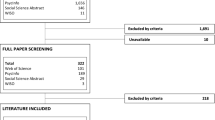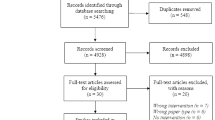Abstract
The Individual Placement and Support model of supported employment is one of the most robust interventions available for people with severe mental illness. Supported employment specialists deliver this intervention. There has been little research on what influences specialists’ performance in the field. This paper redresses this deficit by documenting characteristics and competencies self-reported by specialists as influential to proficient performance in the field. Twenty-two qualitative interviews were conducted with specialists and their supervisors. Content analysis suggested the importance of eight factors: (1) initiative; (2) outreach; (3) persistence; (4) hardiness; (5) empathy; (6) passion; (7) team orientation (8) professionalism.
Similar content being viewed by others
References
Anthony, W. A. (2008). Supported employment in the context of psychiatric rehabilitation. Psychiatric Rehabilitation Journal, 31, 271–272.
Aubry, T. D., Flynn, R. J., Gerber, G., & Dostaler, T. (2005). Identifying the core competencies of community support providers working with people with psychiatric disabilities. Psychiatric Rehabilitation Journal, 28, 346–353.
Becker, D. R., & Drake, R. E. (2003). A working life for people with severe mental illness. New York: Oxford University Press.
Becker, D., Swanson, S., Bond, G., et al. (2008). Supported employment fidelity scale. Lebanon, NH: Dartmouth Psychiatric Research Center.
Blankertz, L. E., & Robinson, S. E. (1996). Who is the psychosocial rehabilitation worker? Psychiatric Rehabilitation Journal, 19, 3–13.
Bond, G. R. (2004). Supported employment: Evidence for an evidence-based practice. Psychiatric Rehabilitation Journal, 27, 345–359.
Bond, G. R., Becker, D. R., Drake, R. E., et al. (2001). Implementing supported employment as an evidence-based practice. Psychiatric Services, 52, 313–322.
Bond, G. R., Drake, R. E., & Becker, D. R. (2008). An update on randomized controlled trials of evidence-based supported employment. Psychiatric Rehabilitation Journal, 31, 280–290.
Clasen, C., Meyer, C., Brun, C., Mase, W., & Cauley, K. (2003). Development of the competency assessment tool—mental health, an instrument to assess core competencies for mental health care workers. Psychiatric Rehabilitation Journal, 27, 10–17.
Cook, J. A. (2006). Employment barriers for persons with psychiatric disabilities: Update of a report for the President’s Commission. Psychiatric Services, 57, 1391–1405.
Coursey, R. D., Curtis, L., Marsh, D. T., Campbell, J., Harding, C., Spaniol, L., et al. (2000a). Competencies for direct service staff members who work with adults with severe mental illnesses: Specific knowledge, attitudes, skills, and bibliography. Psychiatric Rehabilitation Journal, 23, 378–392.
Coursey, R. D., Curtis, L., Marsh, D. T., Campbell, J., Harding, C., Spaniol, L., et al. (2000b). Competencies for direct service staff members who work with adults with severe mental illnesses in outpatient public mental health/managed care systems. Psychiatric Rehabilitation Journal, 23, 370–377.
Drake, R. E., & Bond, G. R. (2008). Supported employment: 1998–2008. Psychiatric Rehabilitation Journal, 31, 274–276.
Gowdy, E. A., Carlson, L. S., & Rapp, C. A. (2003). Organizational factors differentiating high performing from low performing supported employment programs. Psychiatric Rehabilitation Journal, 26, 232–239.
Gowdy, E. A., Carlson, L. S., & Rapp, C. A. (2004). Organizational factors differentiating high performing from low performing supported employment programs. Psychiatric Rehabilitation Journal, 28, 150–156.
Hoge, S., Paris, M., Adger, A., Collins, F. L., Finn, C. V., Fricks, L., et al. (2005). Workforce competencies in behavioral health: an overview. Administration and Policy in Mental Health Services Research, 32, 593–631.
Kvale, S. (1996). Interviews: An introduction to qualitative research interviewing. Thousand Oaks, CA: Sage.
Marshall, T., Rapp, C., Becker, D., & Bond, G. (2008). Key factors for implementing supported employment. Psychiatric Services, 59, 886–892.
Silverman, D. (2001). Interpreting qualitative data. Thousand Oak, CA: Sage.
Strauss, A., & Corbin, J. (1980). Basics of qualitative research. Newbury Park, CA: Sage.
Strickler, D., Whitley, R., Becker, D., & Drake, R. (2009). First person accounts of long-term employment activity among people with dual diagnosis. Psychiatric Rehabilitation Journal, 32, 261–268.
Swanson, S., Becker, D., Drake, R., et al. (2008). Supported employment: A practical guide for practitioners and supervisors. Kearney, NE: Morris Publishing.
Young, A. S., Forquer, S. L., Tran, A., Starzynski, M., & Shatkin, J. (2000). Identifying clinical competencies that support rehabilitation and empowerment in individuals with severe mental illness. Journal of Behavioral Health Services and Research, 27, 321–333.
Author information
Authors and Affiliations
Corresponding author
Rights and permissions
About this article
Cite this article
Whitley, R., Kostick, K.M. & Bush, P.W. Desirable Characteristics and Competencies of Supported Employment Specialists: An Empirically-Grounded Framework. Adm Policy Ment Health 37, 509–519 (2010). https://doi.org/10.1007/s10488-010-0297-9
Published:
Issue Date:
DOI: https://doi.org/10.1007/s10488-010-0297-9




